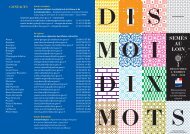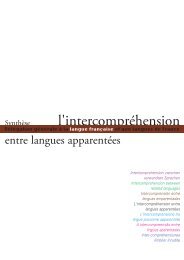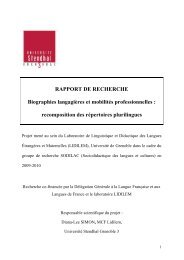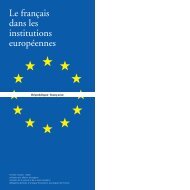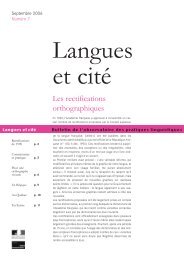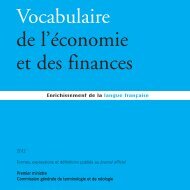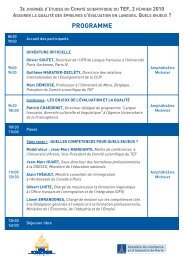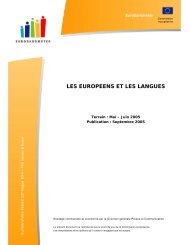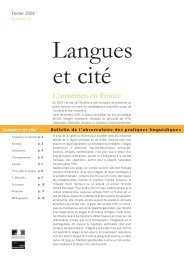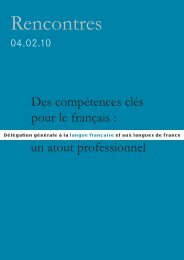Apprendre le français dans un contexte professionnel - Délégation ...
Apprendre le français dans un contexte professionnel - Délégation ...
Apprendre le français dans un contexte professionnel - Délégation ...
You also want an ePaper? Increase the reach of your titles
YUMPU automatically turns print PDFs into web optimized ePapers that Google loves.
BibliographieBoutet J. (1995) : Paro<strong>le</strong>s au travail, Paris : L'Harmattan.De Saint-Georges I. (2004) : Actions, médiations et interactions : <strong>un</strong>e approchemultimoda<strong>le</strong> du travail sur <strong>un</strong> chantier. Cahiers de linguistique <strong>français</strong>e n°26,« Les modè<strong>le</strong>s du discours face au concept d'action », Université de Genève.Green, B. (1997) : Literacy, information and the <strong>le</strong>arning society, JointConference of the Australian Association for the Teaching of English, theAustralian Literacy Educators Association, and the Australian School LibraryAssociation, Darwin.Grünhage-Monetti M. (2005) : TRIM : Training for the Integration of Migrant andEthnik Workers into the Labour Market and Local Comm<strong>un</strong>ity. Schneider VerlagHohengehren GmbH.Grünhage-Monetti M. et al. (2004) : ODYSSEUS : la deuxième langue sur <strong>le</strong> lieude travail. Les besoins linguistiques pour <strong>le</strong>s travail<strong>le</strong>urs migrants : l'organisationde l'apprentissage des langues à des fins <strong>professionnel</strong><strong>le</strong>s. Conseil de l'Europe.Holtzer G. (2004) : Du <strong>français</strong> fonctionnel au <strong>français</strong> sur objectifs spécifiques: histoire des notions et pratiques, <strong>dans</strong> Le <strong>français</strong> <strong>dans</strong> <strong>le</strong> monde,Recherches et applications : De la langue aux métiers, janvier 2004, C<strong>le</strong> internationa<strong>le</strong>t FIPF.Lebel<strong>le</strong> M. et De Ferrari M. (2005) : La maîtrise de la langue en milieu <strong>professionnel</strong>: enjeux et opport<strong>un</strong>ités pour l'entreprise. Un changement de regard surl'apprentissage des compétences langagières, Paris, CLP.Le Boulanger E. (2005) : Aborder la formation linguistique en <strong>contexte</strong> <strong>professionnel</strong>: guide pour des pratiques pertinentes, Paris, CLP.Letertre E. (2006) : « Les mots pour construire » : Lexique <strong>français</strong> de la maçonnerie.Support de formation multimédia à destination des formateurs Bâtimentet FLE. Points comm<strong>un</strong>s n°27, Chambre de Commerce et d'Industrie de Paris.Mangiante J.-M et Parpette C. (2004) : Le <strong>français</strong> sur objectif spécifique,Hachette.Mourlhon-Dallies F. (2006) : Penser <strong>le</strong> <strong>français</strong> langue <strong>professionnel</strong><strong>le</strong>, Le <strong>français</strong><strong>dans</strong> <strong>le</strong> monde, n°346 de juil<strong>le</strong>t. FIPF et CLE International.Mourlhon-Dallies F. et De Ferrari M. (2005) : Développer la formation linguistiqueau titre de la formation <strong>professionnel</strong><strong>le</strong> continue en entreprise, étude de laDirection de la population et des migrations, ministère de l'Emploi, de laCohésion socia<strong>le</strong> et du Logement, rapport final.Wenger E. (1998) : Comm<strong>un</strong>ities of practice : <strong>le</strong>arning, meaning and identity,Cambridge University Press, Cambridge.79



